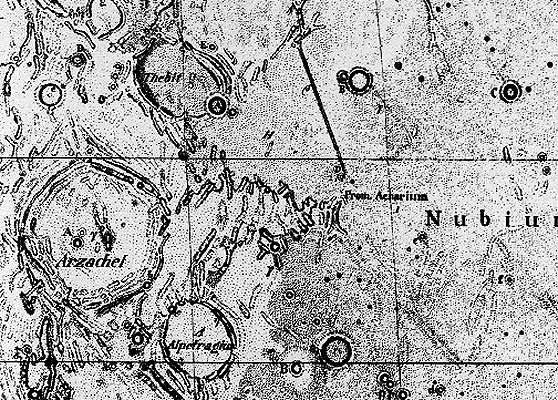Difference between revisions of "January 16, 2004"
| Line 16: | Line 16: | ||
</tr> | </tr> | ||
</table> | </table> | ||
| − | |||
<table class="story" border="0" bgcolor="#FFFFFF" width="90%" cellpadding="10" align="center"><tr><td> | <table class="story" border="0" bgcolor="#FFFFFF" width="90%" cellpadding="10" align="center"><tr><td> | ||
<p class="story" align="center"><b>The End of Lunar Studies</b></p> | <p class="story" align="center"><b>The End of Lunar Studies</b></p> | ||
| Line 30: | Line 29: | ||
This scanned small portion of the Beer & Madler map doesn't do justice to its careful detail. The craters shown are | This scanned small portion of the Beer & Madler map doesn't do justice to its careful detail. The craters shown are | ||
Alpetragius, Arzachel and Thebit with the Straight Wall labeled with a long-tailed Greek letter beta.</p> | Alpetragius, Arzachel and Thebit with the Straight Wall labeled with a long-tailed Greek letter beta.</p> | ||
| − | <p class"story"><b>Related Links:</b><br> | + | <p class="story"><b>Related Links:</b><br> |
[http://search.lindahall.org/events_exhib/exhibit/ex_face_moon.shtml Beer & Madler]<br> | [http://search.lindahall.org/events_exhib/exhibit/ex_face_moon.shtml Beer & Madler]<br> | ||
<i>Epic Moon</i> by Sheehan and Dobbins, 2001, Willmann-Bell, Inc, Chapter 8.</p> | <i>Epic Moon</i> by Sheehan and Dobbins, 2001, Willmann-Bell, Inc, Chapter 8.</p> | ||
| − | <p class"story"> <b>Tomorrow's LPOD:</b> Wood's Spot</p | + | <p class="story"> <b>Tomorrow's LPOD:</b> Wood's Spot</p> |
| − | |||
</table> | </table> | ||
| − | |||
| − | |||
| − | |||
| − | |||
<!-- start bottom --> | <!-- start bottom --> | ||
<table width="100%" border="0" cellspacing="2" cellpadding="4"> | <table width="100%" border="0" cellspacing="2" cellpadding="4"> | ||
| Line 57: | Line 51: | ||
</table> | </table> | ||
<!-- end cal --> | <!-- end cal --> | ||
| − | <div align="center"></div | + | <div align="center"></div> |
| − | |||
<p> </p> | <p> </p> | ||
---- | ---- | ||
===COMMENTS?=== | ===COMMENTS?=== | ||
Click on this icon [[image:PostIcon.jpg]] at the upper right to post a comment. | Click on this icon [[image:PostIcon.jpg]] at the upper right to post a comment. | ||
Revision as of 18:14, 4 January 2015
The End of Lunar Studies
Image Credit: Chuck Wood |
|
The End of Lunar Studies In 1837 a map and book appeared that were so masterful that it was widely assumed that the study of the Moon was then completed. Wilhelm Beer and Johann Heinrich Madler were the authors, but Beer was the banker who provided the observatory and 3.75" refractor, and Madler was the observer, artist and scientist who drew the map, Mappa Selenographica, and wrote the classic book, Der Mond. Madler spent 600 nights observing the Moon. He determined hundreds of crater positions and diameters, measured heights of 800 peaks, and gave more than 100 new names. Strangely, Der Mond was never translated into English, but the principal conclusions have endured: the Moon has no atmosphere, water nor changes. Madler characterized crater rays and rilles and established a classification of craters. He recognized that lunar craters were unlike any on Earth, and his conclusion still stands: "The Moon is no copy of the Earth." Technical Details: Related Links: Tomorrow's LPOD: Wood's Spot |
Author & Editor: Technical Consultant: A service of: |
COMMENTS?
Click on this icon File:PostIcon.jpg at the upper right to post a comment.




